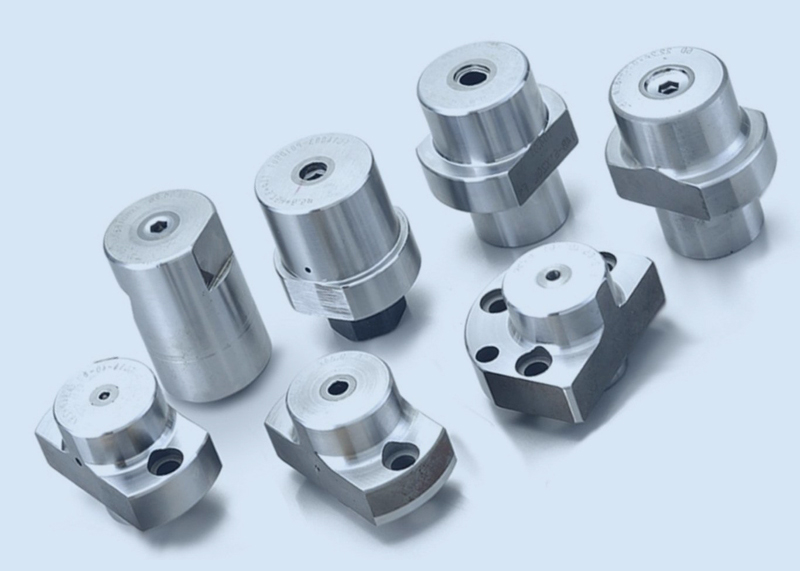What is Nut Forming Dies?
Nut forming dies are specialized tools used in the manufacturing process to shape metal blanks into nuts. These dies are designed to apply high pressure to metal blanks, typically made of materials such as steel or aluminum, to form them into the desired nut shape. Nut forming dies are commonly used in industries such as automotive, aerospace, construction and manufacturing, where nuts are essential components used to fasten and secure various assemblies. The nut forming process typically involves several steps, including blanking, piercing, extrusion, and threading. Nut forming dies play a critical role in each of these steps, providing the shape and forming capacity necessary to transform metal blanks into finished nuts. These dies are precision-engineered to ensure consistent dimensions, tolerances and surface finishes in the final products, which are critical to ensure proper fit and performance in assembly applications.

One of the main characteristics of nut forming dies is their versatility, allowing the production of a wide range of nut shapes, sizes and configurations. Manufacturers can customize nut forming dies to meet the specific requirements of various applications, including standard nuts, hex nuts, flange nuts, square nuts and more. This flexibility enables manufacturers to produce nuts for a variety of fastening applications, from automotive components to construction equipment. Nut forming dies are usually made of hardened steel or other durable materials that can withstand the high pressures and forces encountered during the forming process. These materials are selected for their excellent wear resistance, ensuring long equipment life and minimizing downtime for maintenance or replacement. Due to their robust construction, nut forming dies offer reliable performance in high-volume production environments, contributing to increased productivity and cost-effectiveness.
Nut forming dies can be designed to incorporate specific features such as thread profiles, chamfers or surface coatings to enhance the performance and functionality of the finished nuts. Fastening applications require thread profiles to ensure proper engagement and torque transmission, while chamfers help facilitate smooth access and alignment of nuts during assembly. Surface coatings such as TiN (titanium nitride) or DLC (diamond-like carbon) can improve wear resistance and reduce friction, extend die life, and increase the quality of finished nuts. Nut forming dies are essential tools in the manufacturing process for shaping metal blanks into nuts used in various industries and applications. With their versatility, precision engineering, durability and customization capabilities, nut forming dies enable manufacturers to produce high-quality nuts with consistent dimensional and performance characteristics. By optimizing the nut making process, these dyes contribute to increased productivity, lower costs and improved product quality in the manufacturing process.
Features and Benefits of Nut Forming Dies
The features and benefits of nut forming dies highlight their crucial role in shaping metal blanks into nuts for various industries. Here's a detailed look at what makes nut forming dies essential tools in manufacturing processes:
Precision Engineering:
Nut forming dies are precision-engineered to ensure the accurate shaping and forming of metal blanks into nuts. These dies are meticulously designed to provide consistent dimensions, tolerances, and surface finishes in the finished products. Precision engineering ensures that the nuts produced meet the required specifications for proper fit, functionality, and performance in assembly applications.
Versatility:
Nut forming dies are versatile tools capable of producing a wide range of nut sizes, shapes, and configurations. Manufacturers can customize nut forming dies to meet the specific requirements of different applications, including standard nuts, hex nuts, flange nuts, square nuts, and more. This versatility allows manufacturers to produce nuts for various industries, from automotive and aerospace to construction and manufacturing.
Durability and Wear Resistance:
Nut forming dies are typically made from hardened steel or other durable materials known for their excellent wear resistance. These materials can withstand the high pressures and forces encountered during the forming process, ensuring prolonged tool life and reduced downtime for maintenance or replacement. With their robust construction, nut forming dies offer reliable performance in high-volume manufacturing environments.
Customization Options:
Manufacturers can customize nut forming dies to incorporate specialized features such as thread profiles, chamfers, or surface coatings to enhance the performance and functionality of the finished nuts. Thread profiles are essential for ensuring proper engagement and torque transmission in fastening applications, while chamfers facilitate smooth insertion and alignment of nuts during assembly. Surface coatings such as TiN (titanium nitride) or DLC (diamond-like carbon) improve wear resistance and reduce friction, prolonging the lifespan of the dies and enhancing the quality of the finished nuts.
Increased Productivity:
Nut forming dies contribute to increased productivity in manufacturing processes by optimizing the nut forming process. With their precision engineering, versatility, and durability, these dies enable manufacturers to produce nuts efficiently and cost-effectively. Reduced downtime for maintenance or replacement and improved tool life translate into higher production output and lower operational costs for manufacturers.
Quality Assurance:
The precision and consistency achieved with nut forming dies contribute to the overall quality of the finished nuts. By maintaining tight tolerances and surface finishes, these dies ensure that the nuts produced meet or exceed the required specifications for proper fit, functionality, and performance. Quality assurance is essential for ensuring the reliability and safety of assembled components in various industries and applications.
The features and benefits of nut forming dies make them indispensable tools in manufacturing processes for shaping metal blanks into nuts. With their precision engineering, versatility, durability, customization options, increased productivity, and quality assurance capabilities, nut forming dies enable manufacturers to produce high-quality nuts efficiently and cost-effectively. By optimizing the nut forming process, these dies contribute to the success and competitiveness of manufacturing operations across industries.